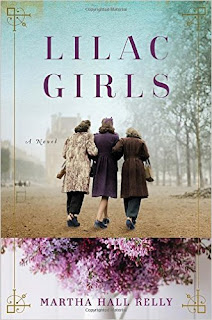Ballantine Books, April 5, 2016.
Three Stars
Lilac Girls follows three women as they experience very different circumstances
during World War II. Based on a real woman with the same name, Caroline
Ferriday is an American socialite who works at the French consulate, when Hitler
invades Poland in 1939. Meanwhile, Kasia is a Polish teenager who risks her
life working as a courier for the underground resistance movement in her home
country. Finally, Herta is an ambitious young German doctor who is willing to
do whatever it takes to get ahead in the male-dominated Nazi regime. When Kasia
is sent to the Ravensbruck concentration camp for women, she crosses paths with
both Herta and Caroline in unforgettable ways.
While Caroline was a real woman, Kasia is based on
the many young women in Ravensbruck who smuggled information to the outside
world, leading to the conviction of their captors for crimes against humanity. The
women were known as “rabbits”, because they were the subject of horrific
medical experiments. Herta is also a compilation of Nazi historical record, illustrating
the shocking acts the Nazis were willing to commit in the name of science.
It can be emotionally exhausting to read another
story of the Holocaust – there are so many tragic tales, and yet each is unique
and necessary to hear. Much of this novel is painful to read, and yet we need
to keep talking about it in order to prevent repetition of these atrocious
crimes. While I sometimes felt that the writing was lacking something – some spark
to hold my attention – I still feel like this is an important book to read.
Most interesting was the focus on the aftermath of the war, and the power of
resilience and survival.
Caroline’s character at first seems flighty and
insubstantial, as she was busy planning fundraiser balls while Kasia was held
captive, starved and tortured. However, Caroline used her social status to
raise large amounts of money to help the Ravensbruck “rabbits” and to bring
French orphans to America during the war. Jumping from Caroline to Kasia to
Herta was often disconcerting because their motivations were so different – the
alternating narratives were difficult to sink into, but each character was
unique.
Martha Hall Kelly undertook extensive historical
research for this novel, as evidenced by the text and also by the author’s note
at the end of the book. Her notes are comprehensive, with much more information
available on her website. It is clear that Kelly is passionate about her
subject, and it shows throughout Lilac
Girls.
I received this novel from Ballantine Books in
exchange for an honest review.

No comments:
Post a Comment